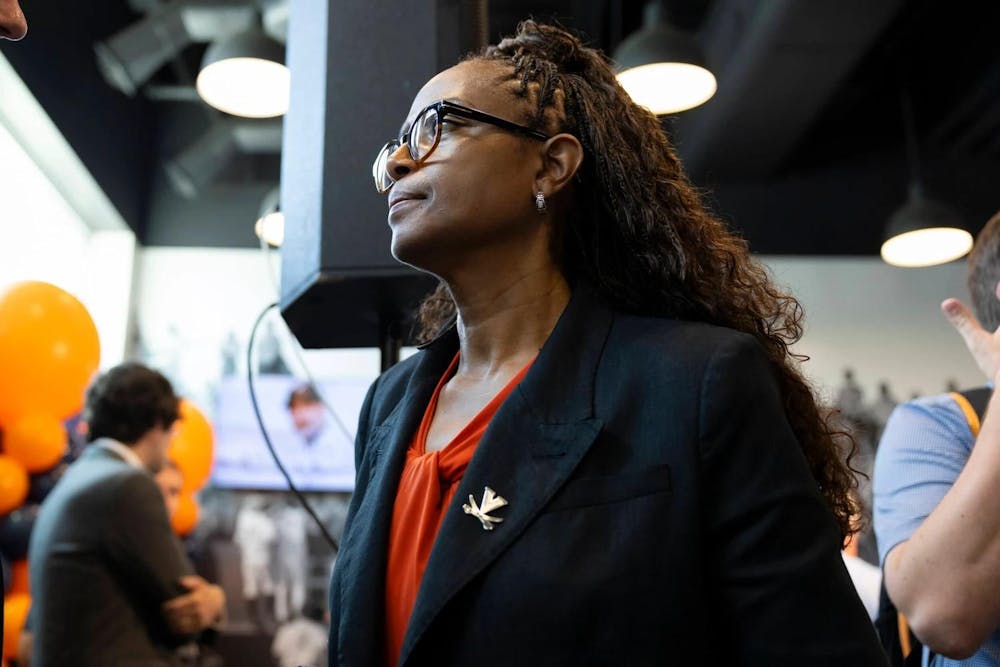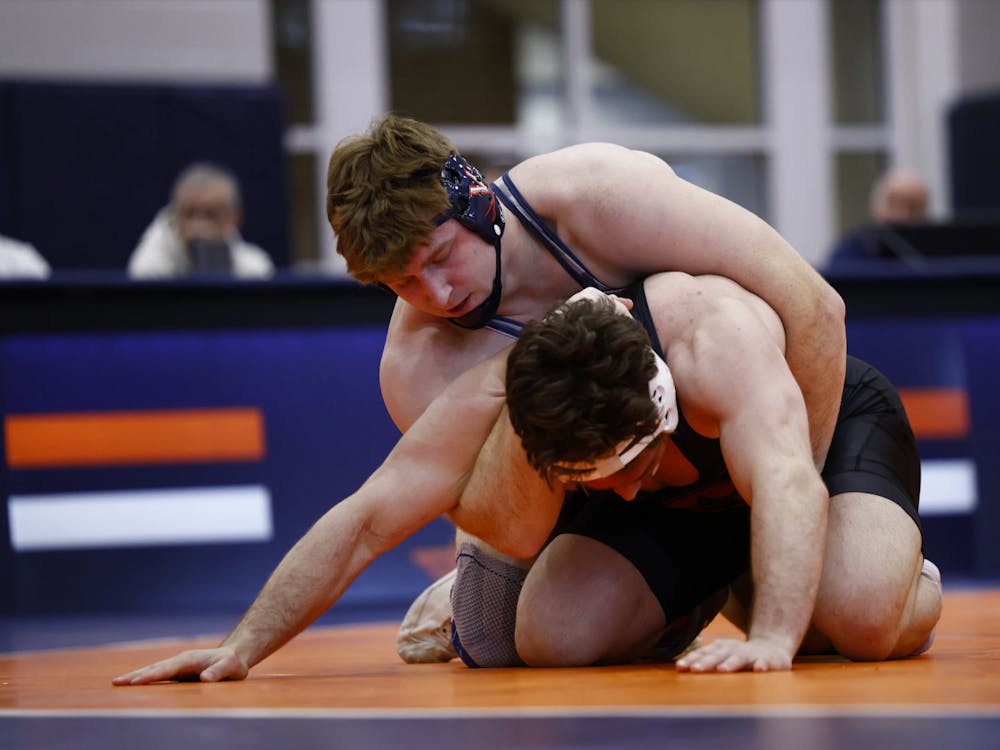The produce section never used to be a town square for John Freeman. Grab your vegetables, bag them and go. Things to do.
Now? Bagging potatoes comes with questions — about revenue sharing, scholarships, the general state of college athletics, questions his fellow grocery shoppers figure he can answer.
Recently the Voice of the Cavaliers is answering those questions from a podcast studio. “Inside Virginia Athletics with Carla Williams,” a new podcast from Virginia’s athletic department, premiered last month, hosted by Freeman and featuring Williams. The two sit down, microphones before them, guest between them, athletic facility filling the background.
The setup, at least, is standard, but the podcast is less so. It is a unique effort in this climate, a foghorn for the athletic director in a sea of babble.
“The goal of the podcast was, ‘Let's get right to the meaty stuff, the questions that they get the most often, the most pressing issues, the difficulties that we're having and how we're trying to solve them,’” Freeman said in an interview.
The questions in the grocery store, or in the gym or the coffee shop, are nothing new for anyone tied to college sports. It is their timbre and topic that have changed over the last few years.
Four years ago came the advent of name, image and likeness (NIL). A stampede of updates followed. Then two months ago, after years of anticipation, came the real tectonic shift, the House v. NCAA settlement
“It’s next to impossible to make sure our fans, supporters, donors, stakeholders are as informed as possible,” Williams said early in the first of the three available episodes. “So we’re just searching for as many ways as possible to make sure that our fans understand what’s happening in college athletics.”
The hope is that it brings clarity — and then engagement. The latter is always a concern for an athletic department. But it is a special priority now, in the wake of the settlement, said Eric Ward, an assistant athletics director for strategic marketing and fan engagement.
The settlement changed everything. There is a $20.5 million revenue sharing cap to reach. There are new scholarships to fund. There are marketing deals to secure under the new NIL model.
“When you get the $20-plus million difference, it obviously needs to be a focus,” Ward said in an interview. “We were working toward fixing some of these things on the financial side well before [the settlement] came down the pipe, in anticipation of it, and now it’s, ‘What’s the next step? What are the other verticals that we can generate more revenue?’”
The onus, in this new world, is on the athletic department to figure it out. Its traditional well of revenue, football money, no longer runs as deep since the settlement.
“We can no longer take money from football and men’s basketball to support the other sports. We have to share that revenue with the student-athletes producing it,” Williams says in the podcast. “So when you do that, it creates a huge hole in your student-athlete budget.”
The University, Williams added, has stepped in with some funding. Common donors have stepped up. But there are other ways to generate revenue — through stadium initiatives, through outreach, through things the department hasn’t even explored yet — that can help, too. But none of it happens without engagement.
“How do you engage your fan base, your donor base, local, regional, national businesses to see value in our student-athletes through true NIL?” Tyler Jones, the school’s newly minted general manager, said on the second podcast episode.
The podcast will help with all that.
But the kernel of it started before all this.
Ward had a view, first from afar as a fan and then once he took his current role three years ago, that there could be greater transparency between the athletic department and its fans. The thought sprouted into the Football Fan Council, launched earlier this year, a group diverse in its fandom that meets to discuss all aspects of the fan experience.
It immediately provided one bit of feedback. Fans wanted more information about college sports’ changing landscape. They craved it, really.
The feedback got shuttled to Williams. A day later, maybe two — cutting through the flotsam drifting around an athletic director every day — came the response. She was in. Loved the idea. She had reasoned, too, that a podcast would be the best way to do it.
The rest of the involved athletic staff agreed with the idea, it being “the method that we decided would be most appropriate and fresh and fun,” Ward said, evergreen and versatile. Freeman, meanwhile, got looped in on an email chain early this summer.
“I just kind of do what I’m told,” Freeman said. “And they were like, ‘You need to host it.’”
The team had one meeting of planning, canvassing the topics they wanted to cover, settling on a vision. Cut the fluff, Williams said. They would dispense with the small talk and get right to the meat of it.
They would focus, instead, on a guiding template, one enumerated in the first episode: where we have been, where we have to be, where we are going. For each topic, each episode, that is the continuum they try to cover.
That is how Williams and Freeman ended up next to Gerry Capone, the longest-tenured employee in the department, in the first episode. They talked about the football program and its trajectory, how its present growth arc started 30 years late, Williams’s aghastness on first touring the football facilities, why investing in football is so crucial for the overall health of the athletic programs.
It is how Jones plopped between the pair in the second episode, covering things from academic deadlines to the inception of a front office model to the perceived transactionalism these days of college sports.
Freeman, entering those first two episodes the team recorded, whipped up a long list of questions. He sent it off to the people in the episodes, and then he looked down at the list. Well, he thought, this is going to be crisscrossed in metaphorical red lines.
“They’re going to say, ‘Don’t ask that. Don’t ask that. Yeah, I probably want to stay away from that one,’” Freeman said. “And everybody was like, ‘Great, let’s do it.’”
He gets to ask whatever he wants, essentially. Half the questions, he estimates, are things he is genuinely curious about, the other half queries to help prompt his colleagues in conveying the processes behind their work.
Williams has a hand in selecting guests and working on the bigger picture, what topics to cover and their sequencing. But when it comes to the questions, Freeman comes up with them, Ward throws a couple in and then they plop down and record.
“She just wants to answer the questions,” Ward said. “And there’s not really been a lot of back and forth on anything. It’s just, here’s the questions that the fans want to hear.”
Williams talking so openly is an unfamiliar sight. She has a reputation for being close-mouthed, available to the media only rarely and briefly, never one for many public appearances.
But with the podcast, she and her guests have, as Freeman says, the time to “talk through their processes and their reasoning and their difficulties and their strengths and how it all fits together in moving this athletic department forward.”
“It's so hard to convey Virginia athletics’ plan in the new era of college sports when your back is pressed up against the wall, five reporters are sticking a microphone in your face, and there's people walking around everywhere, and you don't know which questions are coming,” Freeman said.
Williams, dressed in a t-shirt or a long-sleeve five-peat national champions swimming shirt, explains things with earnestness. It is the first time, for the thousands of listeners, to hear their athletic director truly discussing her vision like this.
The initial target was programming through the end of this calendar year, and they hope to keep it going beyond that. Other episodes, Ward said, will include a deep dive into the department’s finances, a look at the settlement and a podcast on the John Paul Jones Arena seating plan.
Men’s basketball Coach Ryan Odom will be on, at some point, to talk about his transition to his new role and about building a team from scratch. There is also talk of having famous alumni make appearances.
There is no stop date, at any rate, until the topics run dry.







